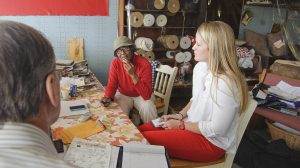
University of Mississippi student Mollie Mansfield, right, interviews civil rights activist and business owner Vernice Sanders, center, with Professor Bill Rose at Vernice’s Upholstery in Leland on March 11, 2014. Photo by Thomas Graning
OXFORD, Miss. – For the third time in seven years, the Meek School of Journalism and New Media at the University of Mississippi has won an annual Robert F. Kennedy Human Rights Journalism Award.
UM’s depth reporting class won in the college category for “Land of Broken Promises.” The exposé examines the impact of the Voting Rights Act of 1965 in the Mississippi Delta 50 years later.
The winning project was led by Willard “Bill” Rose, visiting professor and a fellow of the Overby Center for Southern Journalism and Politics; Mikki Harris, assistant professor; and Darren Sanefski, assistant professor of multiple platform journalism.
“Winning the Kennedy Award for college journalism is a testament to the quality of teaching by Mikki Harris, Bill Rose and Darren Sanefski,” said Will Norton Jr., professor and dean of the journalism school. “These three individuals have demonstrated repeatedly that they are uncommonly effective, student-oriented teachers. We are grateful to have professionals of their caliber on our faculty in the Meek School.”
Twenty-seven students spent spring break 2014 conducting interviews and photographing images for the 132-page, four-color magazine. It was published and distributed in January 2015.
Students who worked on the project included Eliza McClure, Debra Whitley, Erin Scott, Jason Burleson, Logan Kirkland, Thomas Graning, Clancy Smith, Katie Adcock, Karson Brandenburg, Phil McCausland, Cady Herring, Phillip Waller, Mary Marge Locker, Kayleigh Skinner, Alex Edwards, Allison Moore, Mollie Mansfield, Christina Cain, Taylor Davenport, Kristen Ellis, Conner Hegwood, Jessica Hotakainen, Lauren Keossian, Ignacio Murillo, Savannah Pounds, Kimberly Sanner, Madisen Theobald and Ellen Whitaker.
Three reporters both wrote and captured photographs. One worked on the design and captured photographs, and four were dedicated to photojournalism for the project.
“This was a wonderful and unique opportunity for our journalism students to work as multimedia journalists in a very diverse setting,” Rose said. “It’s one of the things I love about working here. Students who are driven to be the best can get opportunities here they won’t get at other journalism schools.”
The project focused primarily on documenting the work of activists in the civil rights movement and their struggles to help people in impoverished areas register and vote in local, state and national elections.
“These students tracked down civil rights legends Andrew Young and John Lewis and lesser known, but influential, civil rights workers to capture what happened here after the Voting Rights Act was passed,” Rose said. “They tackled the tough conversations on race and did it impressively.”
The result was a print depth report produced to raise awareness of this community.
The award is nice, but the experience with the students is the best reward, Harris and Sanefski agreed.
“We used a significant number of archival photos to tell a visual story of major events that happened in the past,” said Harris, who edited the photos to fit the written stories. “The process of spending hours looking at the AP’s archive of images was eye-opening and emotional.”
Archival images selected for inclusion in the project showed activist Fanny Lou Hamer speaking to delegates attending the Democratic National Convention in 1964, civil rights leader Lawrence Guyot as a young man in 1963, covered with marks from a police beating, and Martin Luther King, Floyd McKissick and Stokely Carmichael marching together for equality.
“The images from the 1960s provide a visual of the blood, sweat and strength that laid a foundation for today,” Harris said.
Sanefski’s digital design students spent more than a semester designing the award-winning publication.
“We were not able to accomplish it in one semester, so me and three other students from that class wrapped it up early the next semester,” Sanefski said. “Design is always about making content easier to understand. I’m very proud of my students and all the students who have pooled their talents together to create a great product.”
The journalism school has won previous RFK Awards for magazines on poverty in the Delta and attempts to help residents of an island off the coast of Belize.
“Throughout his life, my father held a deep commitment to freedom of expression and freedom of the press,” said Kerry Kennedy, president of Robert F. Kennedy Human Rights. “He would invite reporters and news crews to join him in the most impoverished city neighborhoods, to Indian reservations and communities in Appalachia, California’s Central Valley or rural Indiana – places that often lacked electricity and plumbing – and he would ask the press corps why it wasn’t covering those issues and these places.
“The journalists who followed his ’68 campaign created the Robert F. Kennedy Journalism Awards in his name, to honor those who covered the issues most important to him.”
This year’s Book and Journalism Award winners were chosen from more than 300 submissions. Historian Michael Beschloss chaired the judges’ panel for the 2016 Robert F. Kennedy Book Award.
The journalism awards ceremony, in its 48th year, will be presented May 25 by Mrs. Robert F. Kennedy at the Newseum in Washington, D.C. All honorees will receive a bust of Robert F. Kennedy in recognition of their award.
For more information about the Meek School of Journalism and New Media, visit http://meek.olemiss.edu.